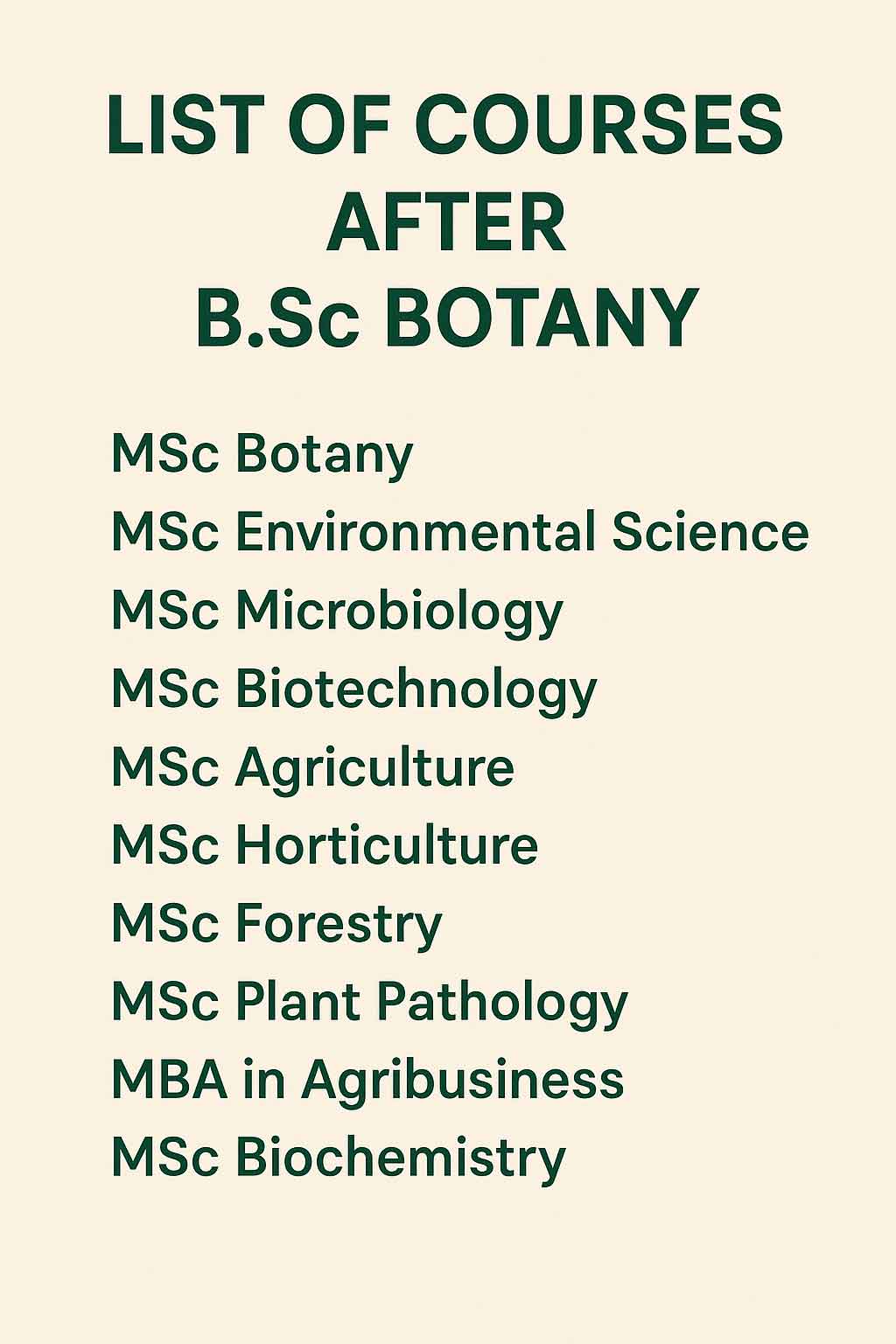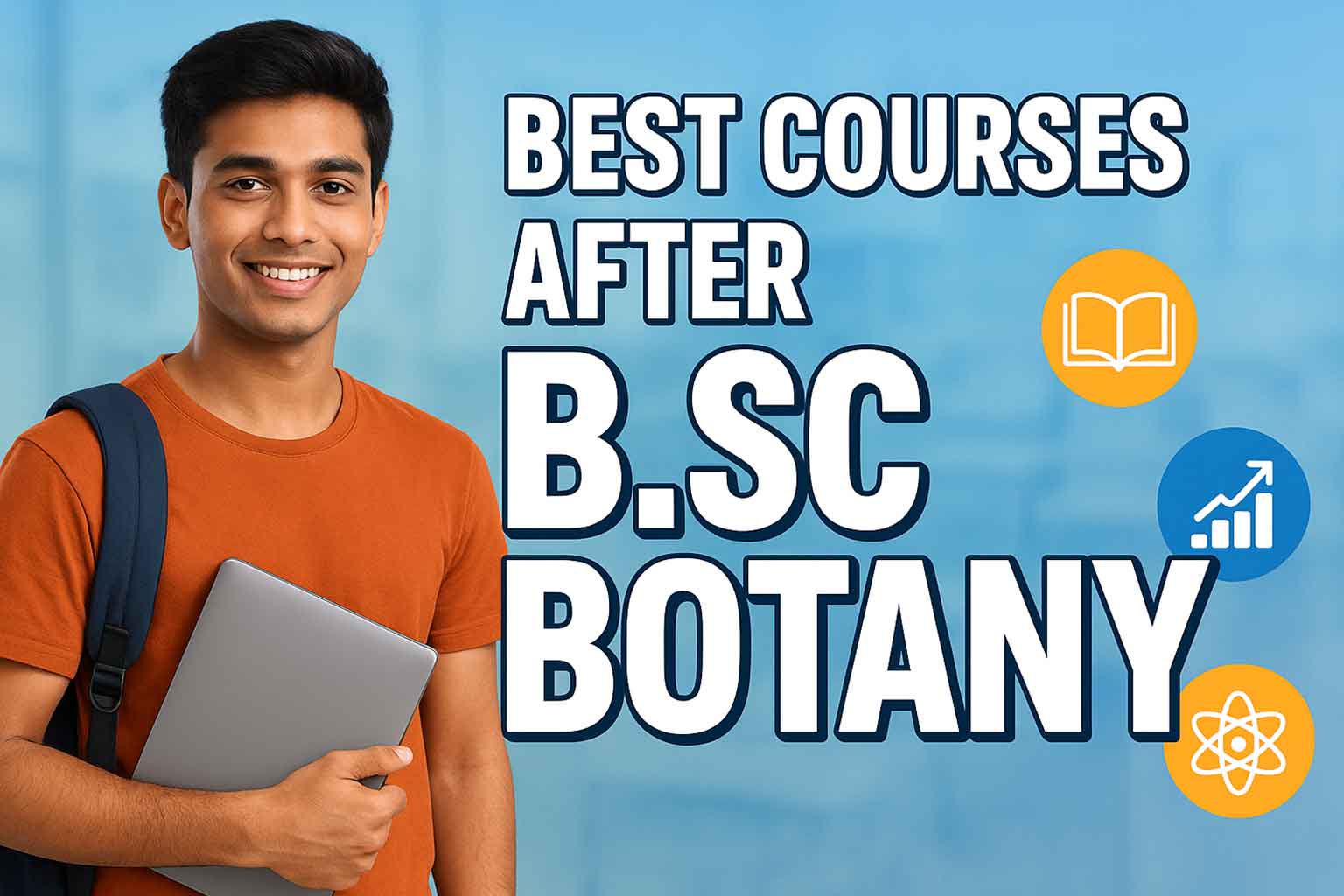Imagine standing in a lush greenhouse, surrounded by vibrant leaves and blooming flowers, realising that your passion for plants could shape the future of food security, medicine, or even climate solutions. If you’ve just wrapped up your BSc in Botany and are wondering about the most promising courses after BSc Botany, you’re not alone. This degree opens doors to a world where science meets sustainability, and the right next step can turn your green thumb into a thriving career.
Welcome to CoursesAfter.com, your friendly guide through the maze of higher education options. We’re here to make your transition smooth and exciting, offering straightforward advice tailored for ambitious graduates like you. Whether you’re eyeing advanced research or practical skills, let’s explore how these paths can align with your dreams. Dive in and discover the best courses after BSc Botany that blend passion with purpose.
After BSc Botany which courses are the best?
Deciding on the best courses after BSc Botany often feels like choosing the perfect soil for your favourite plant—it depends on your goals, whether that’s deep-diving into research, branching into management, or honing hands-on skills. From my chats with recent grads, the top picks usually revolve around deepening plant sciences or pivoting to interdisciplinary fields like environmental tech or biotech.
If you’re research-oriented, an MSc in Botany stands out as the gold standard, building directly on your undergrad knowledge for roles in academia or labs. For those craving real-world impact, MSc Environmental Science edges ahead, tackling pressing issues like biodiversity loss. And if business calls, an MBA in Agribusiness combines your expertise with strategy, perfect for leading sustainable ventures.
Ultimately, the “best” boils down to your interests and market demand. In India, where agriculture and eco-conservation are booming, these courses promise a strong ROI. Let’s break it down further with popular options so that you can envision your path.
List of Popular Courses After BSc Botany

Here’s a curated list of 20 popular courses after BSc Botany, ranked by enrollment trends and job placement rates in 2025. Each one includes key details to help you weigh options. These draw from evergreen favourites in plant sciences to emerging hybrids, ensuring versatility.
MSc Botany
A progression for botany enthusiasts, this program covers plant physiology, taxonomy, and genetics, preparing students for advanced research and crop improvement. Ideal for those passionate about lab work.
- Duration: 2 years
- Eligibility: BSc Botany with 50% aggregate
- Career Options: Botanist, Research Scientist, Academic Lecturer
- Fees: ₹20,000 – ₹1,00,000 per year
- Salary Range: ₹4 – 8 LPA
MSc Environmental Science
Focused on ecosystems and sustainability, this program equips students to address climate change through policy and fieldwork. Suitable for those linking botany with global challenges.
- Duration: 2 years
- Eligibility: BSc in any life science with 50%
- Career Options: Environmental Consultant, Conservationist, Policy Analyst
- Fees: ₹25,000 – ₹1,20,000 per year
- Salary Range: ₹5 – 9 LPA
MSc Microbiology
Explores microbial interactions with plants, bridging botany and health sciences. Ideal for careers in soil health, vaccines, or agri-tech industries.
- Duration: 2 years
- Eligibility: BSc Botany/Biotech with 55%
- Career Options: Microbiologist, Quality Control Analyst, Research Associate
- Fees: ₹30,000 – ₹1,50,000 per year
- Salary Range: ₹4.5 – 7.5 LPA
MSc Biotechnology
An interdisciplinary course covering genetic engineering and bioprocessing, enabling breakthroughs such as GM crops and plant biotech innovations.
- Duration: 2 years
- Eligibility: BSc Life Sciences with 50%
- Career Options: Biotechnologist, Genetic Engineer, Lab Manager
- Fees: ₹40,000 – ₹2,00,000 per year
- Salary Range: ₹6 – 10 LPA
MSc Agriculture
Emphasises crop science and farm management, tailored for students aiming to strengthen food production and agricultural practices.
- Duration: 2 years
- Eligibility: BSc Agriculture/Botany with 50%
- Career Options: Agronomist, Farm Manager, Extension Officer
- Fees: ₹15,000 – ₹80,000 per year
- Salary Range: ₹4 – 7 LPA
MSc Horticulture
Covers fruit, flower, and vegetable cultivation, offering pathways into ornamental and edible plant industries.
- Duration: 2 years
- Eligibility: BSc Botany/Horticulture with 50%
- Career Options: Horticulturist, Landscape Designer, Nursery Manager
- Fees: ₹20,000 – ₹90,000 per year
- Salary Range: ₹3.5 – 6.5 LPA
MSc Forestry
Blends botany with forest management and wildlife conservation, aimed at sustainable timber use and biodiversity protection.
- Duration: 2 years
- Eligibility: BSc Forestry/Botany with 45%
- Career Options: Forester, Wildlife Biologist, Forest Officer
- Fees: ₹25,000 – ₹1,00,000 per year
- Salary Range: ₹5 – 8 LPA
MSc Plant Pathology
Specialises in plant disease diagnosis and control, equipping graduates to combat agricultural threats like fungal infections.
- Duration: 2 years
- Eligibility: BSc Botany with 50%
- Career Options: Plant Pathologist, Disease Control Specialist, Agri-Consultant
- Fees: ₹30,000 – ₹1,20,000 per year
- Salary Range: ₹4 – 7 LPA
MBA in Agribusiness
Combines business management with plant sciences, designed for leadership roles in agri-startups and supply chains.
- Duration: 2 years
- Eligibility: BSc any stream + entrance exam
- Career Options: Agribusiness Manager, Supply Chain Analyst, Entrepreneur
- Fees: ₹1,00,000 – ₹5,00,000 per year
- Salary Range: ₹7 – 12 LPA
MSc Biochemistry
Explores molecular mechanisms in plants, leading to careers in nutritional research, food sciences, or pharmaceuticals.
- Duration: 2 years
- Eligibility: BSc Biochemistry/Botany with 55%
- Career Options: Biochemist, Nutritionist, R&D Scientist
- Fees: ₹35,000 – ₹1,50,000 per year
- Salary Range: ₹5 – 9 LPA
MSc Genetics
Focuses on plant heredity and breeding for resilient crop varieties adapted to changing climates.
- Duration: 2 years
- Eligibility: BSc Genetics/Botany with 50%
- Career Options: Geneticist, Breed Specialist, Biotech Researcher
- Fees: ₹40,000 – ₹1,80,000 per year
- Salary Range: ₹6 – 10 LPA
MSc Ecology
Studies plant-animal interactions and biodiversity, suited for careers in conservation and ecosystem management.
- Duration: 2 years
- Eligibility: BSc Ecology/Botany with 50%
- Career Options: Ecologist, Conservation Planner, NGO Coordinator
- Fees: ₹25,000 – ₹1,10,000 per year
- Salary Range: ₹4.5 – 8 LPA
MSc Medicinal Plants
Focuses on herbal remedies and pharmacological applications, integrating traditional knowledge with modern pharmaceutical research.
- Duration: 2 years
- Eligibility: BSc Botany/Pharmacy with 50%
- Career Options: Herbalist, Pharmacognosist, Ayurvedic Researcher
- Fees: ₹30,000 – ₹1,00,000 per year
- Salary Range: ₹5 – 8 LPA
MSc Plant Breeding
Specialises in hybrid and improved variety development, crucial for food security innovations.
- Duration: 2 years
- Eligibility: BSc Agriculture/Botany with 50%
- Career Options: Plant Breeder, Seed Technologist, Agri-Genetist
- Fees: ₹20,000 – ₹90,000 per year
- Salary Range: ₹5 – 9 LPA
Integrated PhD in Botany
A direct pathway to doctoral research, allowing students to fast-track their academic careers.
- Duration: 5 years
- Eligibility: BSc with 60% + entrance
- Career Options: PhD Researcher, Professor, Scientific Advisor
- Fees: ₹50,000 – ₹2,00,000 total
- Salary Range: ₹8 – 15 LPA (post-PhD)
MSc Taxonomy
Centres on plant classification and biodiversity documentation, a niche field vital for conservation.
- Duration: 2 years
- Eligibility: BSc Botany with 50%
- Career Options: Taxonomist, Museum Curator, Biodiversity Expert
- Fees: ₹25,000 – ₹80,000 per year
- Salary Range: ₹4 – 6.5 LPA
LLB in Environmental Law
Combines legal frameworks with environmental sciences, training professionals to address ecological crimes and compliance.
- Duration: 3 years
- Eligibility: Any BSc + entrance exam
- Career Options: Environmental Lawyer, Policy Advisor, Compliance Officer
- Fees: ₹40,000 – ₹2,00,000 per year
- Salary Range: ₹6 – 11 LPA
MSc in Bioinformatics (Plant Focus)
Applies computational tools and data analytics to plant genomics and molecular biology.
- Duration: 2 years
- Eligibility: BSc Biotech/Botany with 50%
- Career Options: Bioinformatician, Data Analyst, Genomic Researcher
- Fees: ₹50,000 – ₹2,50,000 per year
- Salary Range: ₹7 – 12 LPA
BEd in Science (Botany Specialisation)
Prepares graduates for teaching and curriculum development in science education with a focus on botany.
- Duration: 2 years
- Eligibility: BSc with 50%
- Career Options: School Teacher, Tutor, Curriculum Developer
- Fees: ₹20,000 – ₹60,000 per year
- Salary Range: ₹3 – 6 LPA
Postgraduate Diploma in Rural Management
Blends botany with rural development, focusing on grassroots agricultural and community-based projects.
- Duration: 1 year
- Eligibility: BSc Rural Studies/Botany
- Career Options: Rural Development Officer, NGO Manager, Agri-Coordinator
- Fees: ₹30,000 – ₹1,00,000 total
- Salary Range: ₹4 – 7 LPA
These courses after BSc Botany offer a spectrum from pure science to applied management, each with growing demand in India’s green economy. Choosing one? Consider your aptitude—lab rats might thrive in MSc tracks, while leaders lean toward MBA.
Diploma and Certification Courses After BSc Botany
For quicker upskilling, diplomas and certifications shine, often in under a year and are job-ready. Here’s a list of 15 popular ones, prioritised by industry buzz in 2025. They’re perfect for working pros or those testing the waters before a full master’s.
Diploma in Horticulture
Hands-on training in garden design and crop care, boosting employability in landscaping firms.
- Duration: 1 year
- Eligibility: BSc Botany
- Career Options: Horticulture Technician, Garden Supervisor
- Fees: ₹10,000–₹50,000
- Salary Range: ₹2.5–5 LPA
Diploma in Floriculture
Specialising in flower production and export, ideal for the booming floral trade.
- Duration: 6–12 months
- Eligibility: BSc Life Sciences
- Career Options: Floriculturist, Export Coordinator
- Fees: ₹15,000–₹40,000
- Salary Range: ₹3–5.5 LPA
Diploma in Medicinal Plants
Covering cultivation and extraction of herbs, tying into Ayurveda’s resurgence.
- Duration: 1 year
- Eligibility: BSc Botany
- Career Options: Herbal Technician, Pharma Assistant
- Fees: ₹20,000–₹60,000
- Salary Range: ₹3–6 LPA
Diploma in Environmental Management
Tools for eco-audits and sustainability plans, hot in corporate green initiatives.
- Duration: 6 months
- Eligibility: BSc Environmental Science/Botany
- Career Options: Sustainability Officer, Audit Specialist
- Fees: ₹12,000–₹35,000
- Salary Range: ₹3.5–6 LPA
Diploma in Biotechnology
Lab skills in plant cloning and GM tech, entry to biotech startups.
- Duration: 1 year
- Eligibility: BSc Biotech
- Career Options: Biotech Lab Tech, Research Assistant
- Fees: ₹25,000–₹70,000
- Salary Range: ₹4–7 LPA
Certification in GIS for Botany
Mapping plant distributions with software is essential for conservation projects.
- Duration: 3–6 months
- Eligibility: BSc Geography/Botany
- Career Options: GIS Analyst, Remote Sensing Expert
- Fees: ₹10,000–₹30,000
- Salary Range: ₹4–6.5 LPA
Diploma in Plant Tissue Culture
Techniques for micropropagation are key in rare plant conservation.
- Duration: 6 months
- Eligibility: BSc Botany
- Career Options: Tissue Culture Specialist, Nursery Tech
- Fees: ₹15,000–₹45,000
- Salary Range: ₹3–5 LPA
Certification in Organic Farming
Sustainable practices for chemical-free yields align with organic market growth.
- Duration: 3 months
- Eligibility: BSc Agriculture
- Career Options: Organic Farmer, Certification Auditor
- Fees: ₹8,000–₹25,000
- Salary Range: ₹2.5–4.5 LPA
Diploma in Forestry Management
Basics of woodland stewardship, for entry-level forest dept roles.
- Duration: 1 year
- Eligibility: BSc Forestry
- Career Options: Forest Guard, Range Officer Trainee
- Fees: ₹20,000–₹50,000
- Salary Range: ₹3.5–6 LPA
Certification in Biodiversity Conservation
Strategies for habitat protection are vital for NGO and government agencies.
- Duration: 4 months
- Eligibility: BSc Ecology
- Career Options: Conservation Volunteer Coordinator, Field Biologist
- Fees: ₹12,000–₹35,000
- Salary Range: ₹3–5.5 LPA
Diploma in Agricultural Extension
Community outreach for farming tech adoption, rural-focused.
- Duration: 1 year
- Eligibility: BSc Agri/Botany
- Career Options: Extension Agent, Rural Advisor
- Fees: ₹15,000–₹40,000
- Salary Range: ₹3–5 LPA
Certification in Mycology
Study of fungi in plants, a niche for disease management.
- Duration: 3 months
- Eligibility: BSc Microbiology
- Career Options: Mycologist Assistant, Fungal Researcher
- Fees: ₹10,000–₹30,000
- Salary Range: ₹3.5–6 LPA
Diploma in Landscape Design
Aesthetic plant planning for urban spaces is a creative outlet.
- Duration: 6 months
- Eligibility: BSc Horticulture
- Career Options: Landscape Architect Assistant, Designer
- Fees: ₹18,000–₹50,000
- Salary Range: ₹4–7 LPA
Certification in Ethnobotany
Cultural uses of plants, blending anthropology and botany.
- Duration: 4 months
- Eligibility: BSc Anthropology/Botany
- Career Options: Ethnobotanist, Cultural Heritage Specialist
- Fees: ₹10,000–₹28,000
- Salary Range: ₹3–5 LPA
Diploma in Seed Technology
Quality control and storage methods are the backbone of agri-supply.
Duration: 1 year
Eligibility: BSc Seed Science
Career Options: Seed Analyst, Quality Inspector
Fees: ₹20,000–₹55,000
Salary Range: ₹3.5–6 LPA
These shorter courses after BSc Botany pack a punch, often online or part-time, letting you earn while learning.
Courses After BSc Botany with fees
To help budget your next move, here’s a table of the top 10 popular courses after BSc Botany, sorted by popularity, with average annual fees in India for 2025. Fees vary by institution—government spots are bargains, private premiums.
| Affordable in-state unis | Average Annual Fees (₹) | Notes |
|---|---|---|
| MSc Botany | 20,000–1,00,000 | Subsidised for agri streams |
| MSc Environmental Science | 25,000–1,20,000 | Includes fieldwork costs |
| MSc Microbiology | 30,000–1,50,000 | Lab-heavy, higher in privates |
| MSc Biotechnology | 40,000–2,00,000 | Tech-focused add-ons |
| MSc Agriculture | 15,000–80,000 | Subsidized for agri streams |
| MSc Horticulture | 20,000–90,000 | Practical kits included |
| MBA in Agribusiness | 1,00,000–5,00,000 | Entrance-based scholarships |
| MSc Biochemistry | 35,000–1,50,000 | Research grants available |
| MSc Genetics | 40,000–1,80,000 | Genomics tools extra |
| Diploma in Horticulture | 10,000–50,000 | Short-term, low entry |
Top Courses After BSc Botany with salary
Salary potential is a big draw—here’s a table of the top 10 courses after BSc Botany by popularity, with starting salary ranges in India (2025 estimates). Experience and location (metros vs. rural) boost these figures.
| Course Name | Starting Salary Range (₹ LPA) | Growth Potential |
|---|---|---|
| MSc Botany | 4–8 | Up to 12 LPA in research |
| MSc Environmental Science | 5–9 | 15+ LPA in consulting |
| MSc Microbiology | 4.5–7.5 | 10 LPA in pharma |
| MSc Biotechnology | 6–10 | 18 LPA in biotech firms |
| MSc Agriculture | 4–7 | 9 LPA in govt agri depts |
| MSc Horticulture | 3.5–6.5 | 8 LPA in exports |
| MBA in Agribusiness | 7–12 | 20+ LPA in management |
| MSc Biochemistry | 5–9 | 14 LPA in R&D |
| MSc Genetics | 6–10 | 16 LPA in genomics |
| Diploma in Horticulture | 2.5–5 | 7 LPA with certs |
Top Universities & Colleges Offering Courses After BSc Botany
India boasts world-class institutions for courses after BSc Botany, blending tradition with innovation. Here’s a spotlight on the top 10, based on rankings, faculty, and placements in 2025:
- Banaras Hindu University (BHU), Varanasi – Premier for MSc Botany and Environmental Science; strong research labs.
- Indian Agricultural Research Institute (IARI), New Delhi – Agri-focused MSc programs with farm access.
- University of Delhi – Affordable MSc tracks at Hindu College; vibrant eco-clubs.
- Jawaharlal Nehru University (JNU), New Delhi – Interdisciplinary MSc Ecology, policy emphasis.
- Tamil Nadu Agricultural University (TNAU), Coimbatore – Horticulture and Plant Pathology hubs.
- Punjab Agricultural University (PAU), Ludhiana – Top for MSc Agriculture; industry ties.
- Fergusson College, Pune – MSc Botany with fieldwork in Western Ghats.
- Amity University, Noida – Modern biotech facilities for MSc streams.
- Jamia Millia Islamia, Delhi – Diverse MSc Environmental options; scholarships galore.
- Chandigarh University – Emerging for integrated PhDs; placement-driven.
Conclusion
As we wrap up this guide to the best courses after BSc Botany, remember: your BSc is just the seed—nurture it with a path that excites you. From the research depths of MSc Botany to the practical blooms of diplomas in horticulture, endless opportunities await in a world hungry for plant-savvy pros. Whether chasing high salaries in biotech or meaningful impact in conservation, the key is starting with self-reflection and a bold application.
At CoursesAfter.com, we’re cheering you on every step. Bookmark us for entrance tips, and take that first leap today. What’s your next green adventure? Share in the comments—we’d love to hear. Your future in botany is brighter than you think.

